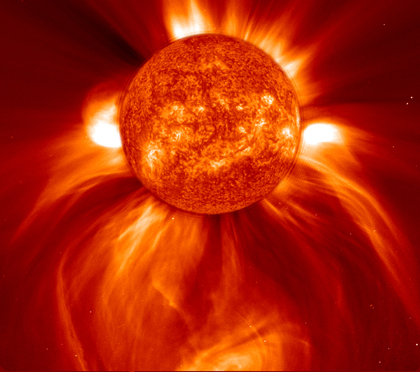Women in the High-Energy Universe: Nancy Brickhouse
This marks the start of a new feature in the Chandra blog that we are calling "Women in the High-Energy Universe." The goal is to highlight and promote the many important ways that women contribute to the pursuit of understanding the Universe through high-energy astrophysics. We've asked various women to tell us -- in their own words -- about their experiences and perspectives of their careers. We invite you to submit your own additional questions to these women, and we will attempt to get them answered. In the meantime, let's meet Dr. Nancy Brickhouse, the first one featured in our new section.
Nancy Brickhouse is a senior astrophysicist at the Smithsonian Astrophysical Observatory who specializes in studying how stars – including our Sun – behave and why. In addition to other telescopes, she uses the Chandra X-ray Observatory to investigate these questions.

I thought I was going to be a lawyer until my senior year in high school. I'm not sure why I decided to major either in physics or chemistry, but I thought math was really fun. Physics won out because there was too much memorization in chemistry. Also physics is an elegant application of math. My interest in astronomy came later, with my first postdoctoral position in solar physics, after I had gotten my Ph.D. in experimental plasma physics.
I believe I was the first woman to get a B.S. in Physics at U.N.C.-Chapel Hill. Some of the professors were very supportive of me. Others were not, but that just made me stubborn. In the lab when I was in graduate school, I was the only spectroscopist, which led to a lot of opportunities to collaborate with the other students on their thesis experiments. Knowing spectroscopy enabled me to switch from physics to astrophysics.
To be an astrophysicist, you have to have curiosity, good math skills, and the ability to stick with a problem for a very long time. And, I think research is fun. You think a certain way about a problem, and then all of a sudden you meet somebody who has a totally different take on it, and you get a lot of new ideas. And there's nothing better than looking at new data for the first time.
-Nancy Brickhouse

Read more about Nancy's research interests in our podcast "Star (X-ray) Light, Star (X-ray) Bright ":
https://chandra.harvard.edu/resources/podcasts/ts/ts280207.html
Or, check out 44i Bootis - The Terrible Twos: What Might Happen If Our Sun Had A Twin:
https://chandra.harvard.edu/photo/2001/0176/index.html
